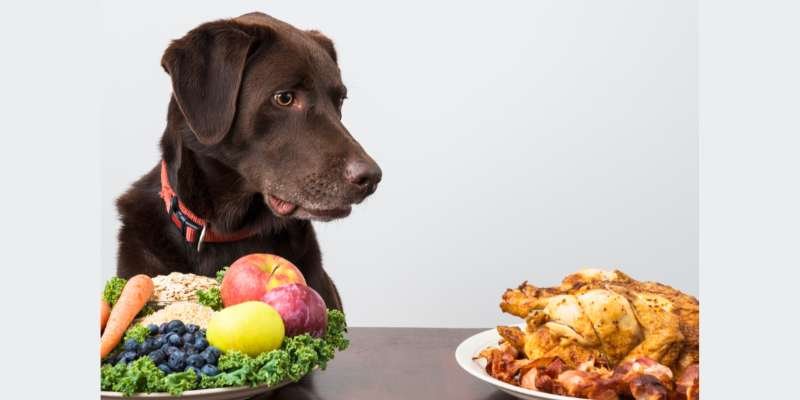Can dogs eat egg rolls? It’s a question that might trigger anxiety and concern for pet owners who love to share meals with their furry companions.
As our four-legged friends watch us enjoy our favorite dishes with those irresistible puppy eyes, the temptation to share a bite is almost impossible to resist.
In this blog post, we delve into the intriguing world of dogs and egg rolls, exploring the question on every pet parent’s mind.
Using this popular human treat, learn 9 interesting facts about canine relationships. Learn how to ensure your pet’s safety and happiness.
Key Takeaways:
-
Canine Curiosity Meets Culinary Caution: Exploring whether dogs can eat egg rolls is a journey filled with emotions and crucial considerations for pet owners.
-
Emotional Stakeholders: The undeniable cuteness of a begging pup adds a personal touch to the quest, making it more than just a culinary inquiry.
-
9 Intriguing Facts: Unraveling a comprehensive set of 9 interesting facts sheds light on the complexities of dogs and egg rolls, offering valuable insights into responsible pet ownership.
-
Flavorful Blend: The blog post navigates through the delicate balance of canine cravings and caution when sharing human food with our four-legged companions.
-
Culinary Crossroads: At the heart of it all, the post addresses the central question, “Can dogs eat egg rolls?” with a mix of emotions and informative content for a well-rounded understanding.
Can dogs eat egg rolls? 9 interesting facts
Feeding dogs human food, including egg rolls, can be risky as some ingredients may be harmful to them. It’s important to note that dogs have different dietary needs than humans, and certain foods that are safe for us can be toxic to them. Here are nine interesting facts related to dogs and egg rolls:
1. Ingredients Matter:
The ingredients in egg rolls can vary, but some common components include onions, garlic, and seasonings that may not be suitable for dogs. Onions and garlic, in particular, can be toxic to dogs and should be avoided.
2. Fried Foods and Dogs:
Fried foods like egg rolls are often high in fat, which can lead to digestive upset and, in severe cases, pancreatitis in dogs. It’s generally advisable to avoid feeding dogs deep-fried or greasy foods.
3. Soy Sauce Concerns:
Soy sauce, a common condiment in Asian cuisine, is high in sodium. Excessive salt intake can lead to sodium ion poisoning in dogs, causing symptoms such as vomiting, diarrhea, tremors, and in severe cases, seizures.
4. Allergies and Sensitivities:
Dogs, like humans, can have food allergies or sensitivities. Ingredients like wheat, found in the egg roll wrapper, may not agree with some dogs and could lead to allergic reactions or gastrointestinal issues.
5. Spices and Seasonings:
Spices and seasonings used in egg rolls may not be suitable for dogs. Some spices can cause stomach upset or, in extreme cases, be toxic. It’s best to stick to plain, unseasoned foods for your dog.
6. Gastrointestinal Upset:
Sudden changes in a dog’s diet, especially to rich or unfamiliar foods like egg rolls, can result in gastrointestinal upset. This may include vomiting, diarrhea, and abdominal discomfort.
7. Small Bone Hazard:
If the egg roll contains small bones, they can pose a choking hazard or, in some cases, cause intestinal blockages in dogs. It’s generally safer to provide boneless, cooked meats if you want to share a treat with your dog.
8. Caloric Concerns:
Egg rolls are often calorie-dense due to their fried nature and the ingredients used. Feeding dogs high-calorie human foods regularly can contribute to obesity and related health issues.
9. Consult Your Veterinarian:
Before introducing any new human food into your dog’s diet, it’s always best to consult with your veterinarian. They can provide guidance based on your dog’s specific health, dietary needs, and potential sensitivities.
In summary, it’s generally not recommended to feed dogs egg rolls or other human foods that may contain harmful ingredients. If you want to treat your dog, opt for dog-friendly snacks or consult with your veterinarian for safe options.
Read more about dogs: How do dogs know how to open doors? (Answered)
Keep An Eye On Egg Roll Ingredients
When sharing egg rolls with your canine companion, scrutinizing the ingredients is paramount. Hidden additives like onions or garlic can harm dogs. Prioritize their well-being by ensuring that the ingredients are canine-friendly, steering clear of potential hazards that may lurk in the enticing folds of a tasty treat.
Can dogs eat egg rolls?
No, feeding dogs egg rolls is risky due to harmful ingredients like garlic and onions. While a small, plain piece may be safe, avoid sharing. Dogs have sensitive stomachs, and unexpected ingredients can cause digestive upset or harm. Always prioritize your furry friend’s well-being over tempting treats!
Is it okay for my dog to eat rolls?
Yes, you can give your dog rolls to eat, but it depends on the type of roll. Plain rolls, such as plain bread or simple tortillas, are generally safe in moderation.
However, it’s crucial to avoid rolls with potentially harmful ingredients like onions, garlic, or excessive salt. These ingredients can poison dogs.
Additionally, be cautious about rich or greasy rolls, as they may upset your dog’s stomach. Always remove any potential choking hazards, and introduce new foods gradually.
Before introducing rolls or any new food into your dog’s diet, consult your veterinarian for personalized advice.
The different types of egg rolls
Egg rolls are a diverse category of rolled appetizers, each with unique ingredients and cultural influences. Here are several types of egg rolls from different culinary traditions:
Egg rolls in Chinese style:
Classic Chinese egg rolls typically contain vegetables like cabbage, carrots, and bean sprouts, along with meat like pork or shrimp. These vegetables are wrapped in pastry and deep-fried.
Spring rolls:
Commonly found in East Asian cuisine, spring rolls often feature fresh, raw ingredients like shrimp, herbs, rice vermicelli, and vegetables. They are typically served fresh or fried.
Vietnamese Egg Rolls (Cha Gio):
These are similar to Chinese egg rolls but often include rice noodles and served with dipping sauces like nuoc cham.
Filipino Lumpia:
Lumpia is the Filipino version of egg rolls, featuring a mix of savory ingredients such as minced meat, vegetables, and sometimes even sweet fillings.
Thai Egg Rolls:
Thai egg rolls may include unique ingredients like glass noodles, mushrooms, and Thai spices, creating a distinctive flavor profile.
Vegetarian Egg Rolls:
Catering to various dietary preferences, vegetarian egg rolls are filled with vegetables, tofu, or other plant-based proteins.
Southwestern Egg Rolls:
A fusion variation, these rolls often include ingredients like black beans, corn, chicken, and spices, inspired by the American Southwest.
Dessert: Egg rolls:
Some cultures create sweet versions, filling them with fruits, sweet beans, or chocolate for a delicious dessert twist.
Each type of egg roll showcases the diversity and adaptability of this popular appetizer across different cuisines.
What potential hazards are there? Can Dogs Eat Egg Rolls?
When considering whether dogs can eat egg rolls, it’s essential to know potential hazards associated with certain ingredients commonly found in this popular appetizer.
Toxic ingredients:
Many traditional egg roll recipes include onions and garlic, which are toxic to dogs. These substances can damage red blood cells, leading to hemolytic anemia. Symptoms may include weakness, lethargy, and discolored urine.
High salt content:
Egg rolls often contain salt, and excessive salt intake can harm dogs. Dogs have a lower tolerance for salt than humans, and consuming too much salt can lead to sodium ion poisoning. This may result in symptoms such as excessive thirst, urination, vomiting, diarrhea, and, in severe cases, seizures.
Rich or Greasy Nature:
The rich and greasy nature of certain egg rolls can harm a dog’s digestive system. Dogs may experience gastrointestinal upset, including vomiting and diarrhea, after consuming foods high in fat. Pancreatitis, an inflammation of the pancreas, is a potential complication associated with high-fat diets.
While sharing a small, plain portion of an egg roll may not immediately harm your dog, it’s crucial to exercise caution. This is due to the potential hazards associated with specific ingredients and egg rolls’ overall nature.
Before introducing human food into your dog’s diet, consult with your veterinarian to ensure its safety and well-being. Responsible pet ownership involves being mindful of food ingredients and understanding the potential risks they pose to your dog’s health.
What are the reasons I should not give egg rolls to my dog?
There are several reasons why you should exercise caution and avoid giving egg rolls to your dog:
-
Toxic Ingredients: Traditional egg roll recipes often contain onions and garlic, both toxic to dogs. These can lead to serious health issues, such as damage to red blood cells and hemolytic anemia.
-
High Salt Content: Egg rolls typically have a considerable salt content, and excessive salt intake can lead to sodium ion poisoning in dogs. This can result in symptoms such as increased thirst, urination, vomiting, diarrhea, and, in severe cases, seizures.
-
Rich and greasy nature: The rich and greasy nature of certain egg rolls can challenge a dog High-fat foods may cause gastrointestinal upset, including vomiting and diarrhea. In more severe cases, it could contribute to pancreatitis, an inflammation of the pancreas.
-
Choking Hazard: The structure and consistency of egg rolls can pose a choking hazard for dogs, especially if they attempt to swallow a large piece without proper chewing.
-
Nutritional Imbalance: While small amounts of plain, well-cooked egg rolls might not be immediately harmful, it’s crucial to consider the overall nutrient balance of your dog’s diet. Dog food is specifically formulated to meet their nutritional needs, and introducing too many human foods can upset this balance.
In summary, it’s recommended to avoid giving egg rolls or any human food to your dog, especially without consulting your veterinarian. Ensuring your dog’s diet aligns with their specific nutritional requirements is key to maintaining their health and well-being. Always prioritize safety by knowing potential hazards associated with certain foods.
What else can I feed my dog if he’s not getting enough food?
While it’s essential to prioritize a balanced and nutritionally complete diet for your dog, there are some dog-friendly foods you can occasionally share with them as treats or additions to their meals. Remember to introduce new foods gradually and in moderation. Here are some options.
-
Lean Meats: Cooked lean meats like chicken, turkey, or lean beef are healthy protein sources for dogs. Ensure the meat is plain, without added seasonings or sauces.
-
Fish: Salmon and other fish provide omega-3 fatty acids, benefiting your dog’s skin and coat. Make sure the fish is fully cooked, and avoid bones.
-
Vegetables: Dogs enjoy carrots, green beans, and broccoli. These can be served raw or lightly cooked.
-
Fruits: Some fruits are safe for dogs and offer vitamins and antioxidants. Apples (without seeds), blueberries, and watermelon are popular choices.
-
Plain Rice or Pasta: These can be added to your dog’s meals occasionally, especially if they have a sensitive stomach.
-
Eggs: Cooked eggs are an excellent source of protein. Make sure they are fully cooked and avoid seasonings.
-
Dairy: Plain, unsweetened yogurt or cheese in small amounts can be a tasty and calcium-rich addition to your dog’s diet.
-
Peanut Butter: Unsalted, unsweetened peanut butter (without xylitol) is a delicious treat for dogs. It’s often used in puzzle toys or as stuffing for Kongs.
-
Sweet Potatoes: Cooked and plain sweet potatoes are an excellent source of fiber and vitamins for dogs.
Always be mindful of portion sizes, and consult with your veterinarian before making significant changes to your dog’s diet. Additionally, remember that some dogs may have allergies or sensitivities to certain foods, so monitor their reactions when introducing new items.
Read more: Can Rabbits Eat Parsnips: Exploring Rabbit-Friendly Nutrition
What Are Some Pet-Safe Egg Roll Alternatives For Dogs?
When it comes to treating your canine companion, it’s crucial to choose pet-safe alternatives. Steer clear of potential hazards like onions and excessive salt. Consider these delightful alternatives that your dog can enjoy without compromising their health.
Pet-Safe Egg Roll Alternatives:
When it comes to treating your canine companion, it’s crucial to choose pet-safe alternatives. Steering clear of potential hazards like onions and excessive salt, consider these delightful alternatives that your dog can enjoy without compromising their health.
- Pet-Safe Egg Roll Alternatives:
- Plain cooked chicken strips
- Carrot Sticks
- Blueberries
- Plain Rice
- Apple Slices (without seeds)
- Green Beans
- Unsalted and Unseasoned Popcorn
- Pumpkin Chunks
- Broccoli Florets
- Small Pieces of Cooked Salmon
FAQs about Can dogs eat egg rolls?
Is it safe to eat egg rolls?
While egg rolls are generally safe for humans, moderation is key due to their often high fat and calorie content. Dogs should avoid them, as ingredients like onions and garlic can be toxic, and fried foods may cause digestive issues.
Can dogs eat a roll?
Plain rolls, like bread, are generally safe for dogs in small amounts. However, rolls with harmful ingredients, such as onion or garlic, should be avoided. Always consider your dog’s specific dietary needs and consult your veterinarian.
Can dogs eat eggs sick?
If a dog is unwell, it’s best to consult a vet before introducing any new foods, including eggs. In general, plain, cooked eggs can be part of a healthy diet for dogs, but individual health conditions may influence their suitability.
Can dogs eat egg yolk?
Yes, dogs can eat cooked egg yolks in moderation. Yolks are a good source of protein and various nutrients. However, the egg should be fully cooked to avoid any risk of Salmonella, and other ingredients should be dog-safe.
Can dogs eat 2 eggs a day?
Feeding two eggs a day to a dog depends on factors like size, health, and overall diet. While eggs are nutritious, excessive consumption can lead to imbalances. Consult your veterinarian to determine the appropriate egg intake based on your dog’s individual needs.
Can dogs eat omelets?
Dogs can eat plain, well-cooked omelets in moderation. Avoid adding harmful ingredients like onions and garlic. Eggs provide protein and essential nutrients. Introduce new foods gradually and monitor for any adverse reactions. Always consult your vet for personalized dietary advice.
Conclusion about Can dogs eat egg rolls?
In conclusion, it is not recommended to feed dogs egg rolls. The potential presence of harmful ingredients like onions, garlic, and the high fat content from frying can pose risks to a dog’s health. It’s safer to stick to a well-balanced, dog-friendly diet and consult with a veterinarian for suitable treat options.





